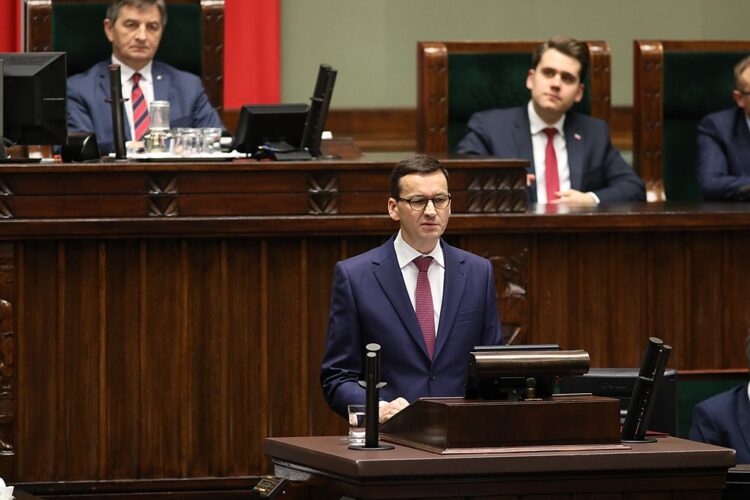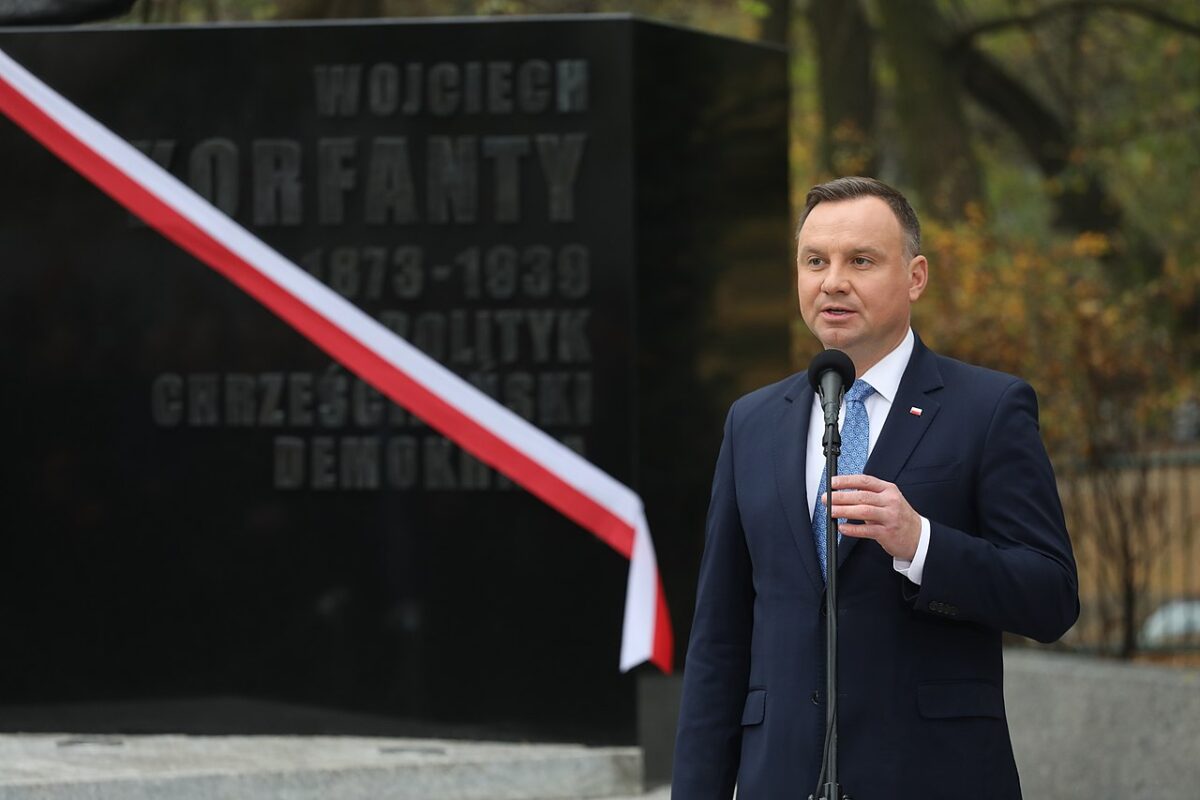Israel and Poland are at war again, figuratively speaking at least. For the second time since 2018, they are embroiled in a nasty war of words, which have had an unsettling effect on their bilateral relations.
This increasingly bitter diplomatic row revolves around a Polish parliamentary bill which drastically limits the ability of Holocaust survivors and their descendants to recover property seized from Polish Jews by the Nazis and the Communist regime. This covers a period from 1939 to 1989, when Poland was either occupied by Germany or under the sway of the now-defunct Soviet Union.
The bill, passed by Poland’s parliament on August 11 and approved by President Andrzej Duda three days later, will affect Jews as well as non-Jews. It sets a 30-year time limit on legal challenges to property confiscations. This means that pending proceedings related to property appropriations during the Communist era would be be dismissed or discontinued, leaving claimants high and dry.
Israel’s latest quarrel with Poland comes just three years after the Sejm, the Polish lower house, passed legislation criminalizing criticism blaming Poles for crimes committed against Jews, who formed nearly 10 percent of Poland’s population on the eve of Germany’s invasion.
Critics in Israel and the Diaspora lambasted the law, condemning it as crude attempt to absolve Polish antisemites and collaborators and rewrite history.

The then Israeli prime minister, Benjamin Netanyahu, and his Polish counterpart, Mateusz Morawiecki, tried to smooth things over in a joint declaration hailing three decades of Israeli-Polish cooperation, but a residue of bitterness remained.
The current bill on property restitution won passage in both the lower and upper houses of Parliament before Duda signed it into law. Israel implored Poland to shelve it, with Knesset Speaker Mickey Levy threatening to dissolve the parliamentary Israel-Poland friendship group if the Polish government went ahead with its plan.
According to Duda, the bill will end an “era of legal chaos,” block false claims, and restore legal certainty to the property market.
With this law having been ratified, Poland now has the dubious distinction of being the only country in the former East European Communist bloc not to have returned confiscated private property to their Jewish owners.
The Polish government has given back Jewish community properties, including synagogue buildings. But it steadfastly refuses to hand back properties that were owned by Jews, or provide compensation.
This is an issue that has been festering for years now. On my last two visits to Poland, in 2009 and 2016, I discussed it with Polish government officials and came away with the strong impression that Poland is financially unable to offer compensation for lost properties.
True or not, this argument begs the question why Poland’s neighbors, from Hungary to the Czech Republic, have in fact returned private Jewish properties to their rightful heirs.
Why is Poland so exceptional?
I have yet to hear a plausible explanation from the Polish authorities.
To its detriment, Poland preempted the issue by passing a bill that, as the U.S. State Department says, “severely restricts the process for Holocaust survivors and their families, as well as other Jewish and non-Jewish property owners, to obtain restitution for property wrongfully confiscated …”
U.S. Secretary of State Antony Blinken was even more forthright. “We urge the Polish government to consult with representatives of affected parties and to develop a clear, efficient, and effective legal procedure to resolve confiscated property claims and provide some measure of justice for victims,” he said. “In the absence of such a procedure, this legislation will harm all Polish citizens whose property was unjustly taken, including that of Polish Jews who were victims of the Holocaust.”
Emotions ran high, far too high, as Israel and Poland exchanged barbs in the last few days.
After Duda signed the bill, Israeli Foreign Minister Yair Lapid, the son of a Hungarian Holocaust survivor and a former Israeli cabinet minister, tweeted, “Poland, not for the first time, passed an antisemitic and immoral law.”

He also instructed Israel’s charge d’affaires in Warsaw to return to Israel immediately, and he let it be known that Israel’s incoming ambassador to Poland, Yaakov Livne, would not be taking up his post “at this stage.”
Lapid added, “Today, Poland turned into an anti-democratic, illiberal country that doesn’t respect the greatest tragedy in human history. We must never remain silent. Israel and the Jewish people definitely will not be silent.”
Israel’s Foreign Ministry, meanwhile, advised Poland’s ambassador to Israel, Marek Magierowski, to extend his vacation in Poland.

Duda’s political advisor, Jacob Kumoch, described Lapid’s response as “hysterical and against all diplomatic norms” and urged Israel to rethink its position.
Wading into the controversy, Israeli Prime Minister Naftali Bennett denounced Duda’s ratification of the bill as “a shameful decision” that showed “disgraceful contempt for the memory of the Holocaust.”
Defence Minister Benny Gantz declared, “As the son of Holocaust survivors, I am deeply disturbed by the law passed in Poland that effectively prevents justice for the victims of the Holocaust and their families.”
Responding to these allegations, Morawiecki rejected accusations that the law is antisemitic and expressed indignation that Israel’s charge d’affaires had been recalled. “If the Israeli government continues to attack Poland in this way, it will have a very negative impact on our relations — both bilateral and those in the international arena,” he warned. Israel’s stance threatened to “increase hatred toward Poland and Poles,” he added.
Reacting to Morawiecki comments, Lapid wrote on Twitter, “Gone are the days when Poles harmed Jews without consequence. Today, Jews have a proud and strong country of their own. We do not fear antisemitic threats, and have no intention of turning a blind eye to the shameful conduct of the anti-democratic Polish government.”
And in another blast, Lapid claimed that the new law “borders on Holocaust denial” and warned, “The Poles cannot continue harming the memory of those who perished.”

Casting aspersions on Israeli youth trips to Poland, Polish Deputy Foreign Minister Pavel Jablonski said that they “sometimes instill hatred for Poland” and that their propriety would be examined.
It’s obvious that these tit-for-tat exchanges have spinned out of control and that both sides must exercise diplomatic restraint. Lapid’s characterization of Poland’s legislation as antisemitic and bordering on Holocaust denial is simplistic and ultimately ridiculous. Yet it’s also clear that the law Poland has enacted is unfair and unjust and should be adjusted or dropped.
High-ranking Israeli and Polish officials should meet and review the issue and devise a face-saving compromise acceptable to both sides. Israel and Poland should not permit this disagreement to degenerate into a full-blown crisis.
The United States, which has close ties with both countries, can serve as an intermediary.
Israel and Poland share a multiplicity of political and economic interests and historical and cultural values honed by centuries of contact. These connections must not be sacrificed over one harsh disagreement, however important it may be.
